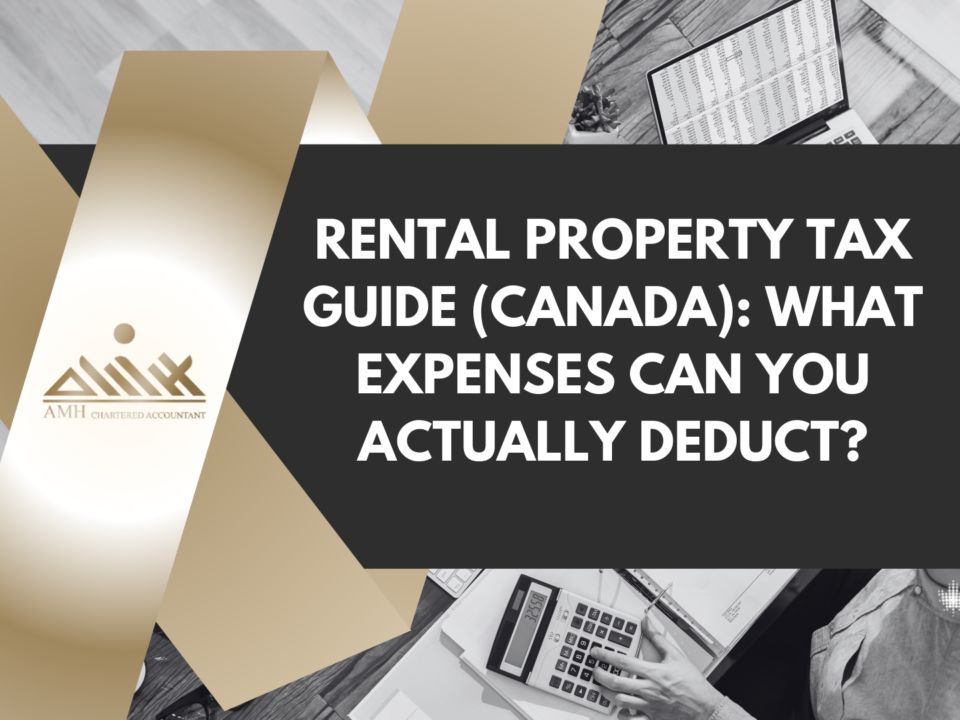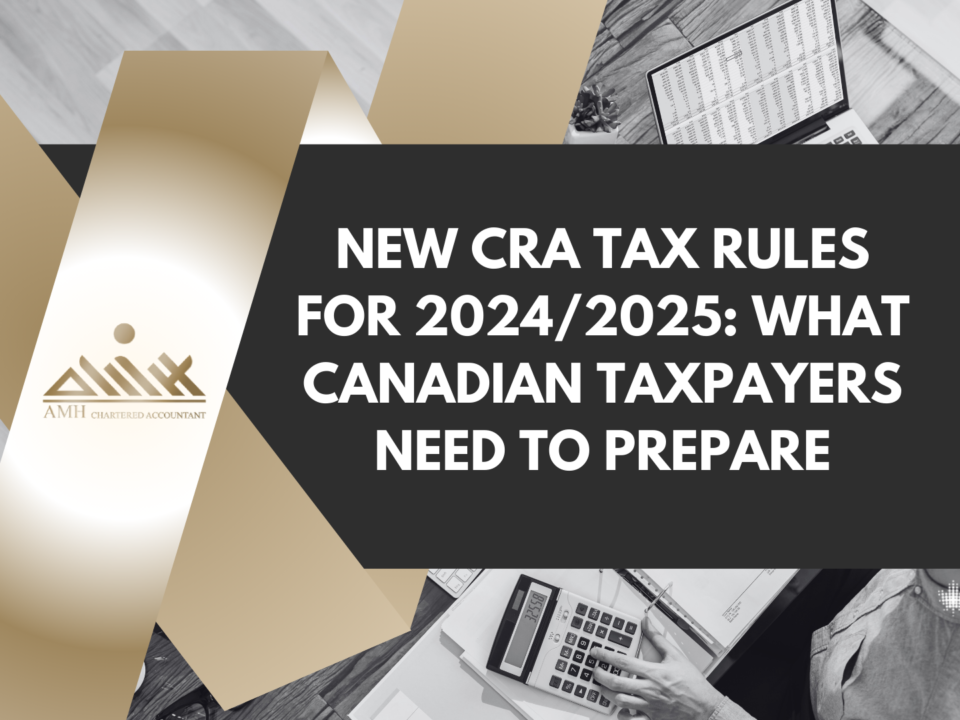
Financial Implications of Transitioning from Sole Proprietor to Corporation
September 20, 2025
Why Bookkeeping is Essential for Small Businesses in Toronto
November 1, 2025T2 Corporate Tax Return: What Business Owners Need to Know
As a corporate business owner in Toronto, Milton, Oakville, Hamilton, Kitchener, Waterloo, or the GTA, filing a T2 Corporate Tax Return is an essential part of ensuring your company remains compliant with Canadian tax regulations. The T2 return is the form used by Canadian corporations to report income, deductions, and taxes owed to the Canada Revenue Agency (CRA).
Whether you are a new corporation or have been operating for years, understanding the T2 Corporate Tax Return process is critical for the smooth running of your business. At AMH Chartered Professional Accountant, we specialize in guiding businesses through the complexities of corporate tax filing, ensuring that your T2 return is filed correctly and on time.
This article will provide an overview of the T2 Corporate Tax Return, the key components you need to understand, the deadlines, and common mistakes to avoid.
Introduction: Understanding the T2 Corporate Tax Return
The T2 Corporate Tax Return is a comprehensive document required for Canadian corporations to report their financial activities and tax obligations. This filing provides the Canada Revenue Agency (CRA) with the necessary information to assess the taxes owed by your company for the fiscal year.
Every corporation in Canada, whether incorporated federally or provincially, must file a T2 return. The T2 return helps determine how much tax a business owes based on its income, expenses, and applicable tax credits. It is important to note that the T2 return is separate from personal income tax filings and must be filed in accordance with the corporate fiscal year-end.
What is the T2 Corporate Tax Return?
The T2 Corporate Tax Return is the form used by corporations to report their annual income, calculate taxable income, and determine the amount of tax owed. It includes detailed information about the company’s financial performance, such as:
Corporate income: Earnings and revenue generated by the business.
Expenses: Allowable expenses that can be deducted from income to reduce taxable income.
Tax credits: Any credits available to the corporation, such as research and development incentives or small business deductions.
This return is submitted to the Canada Revenue Agency (CRA), which uses it to assess the corporation’s tax obligations.
Who Needs to File the T2 Corporate Tax Return?
Any corporation that operates in Canada, including small businesses, large corporations, and non-profit organizations, must file a T2 Corporate Tax Return. Here are some key scenarios where filing the T2 return is required:
Active Corporations: All corporations that are operational and earn revenue are required to file a T2 return.
Inactive Corporations: Even if your corporation does not conduct business or generate income, a T2 return must still be filed to maintain good standing with the CRA.
New Corporations: If you’ve recently incorporated your business, you must file a T2 return even if your company is still in its startup phase and hasn’t yet generated revenue.
Certain corporations may qualify for specific exemptions or tax breaks, such as small business deductions, but the T2 return is still mandatory for most businesses.
Key Components of the T2 Corporate Tax Return
The T2 Corporate Tax Return is a detailed form that covers various aspects of a corporation’s financial activities. Below are the key components that business owners need to be aware of:
1. Corporate Income: Reporting Your Company’s Revenue
One of the most important sections of the T2 Corporate Tax Return is reporting the corporate income. This includes all income earned by the corporation during the fiscal year. Sources of corporate income may include:
Sales Revenue: Earnings from the sale of goods or services.
Investment Income: Income earned from investments, such as interest or dividends.
Other Income: Other business-related income, such as rental income or licensing fees.
The income reported on the T2 form will be the basis for calculating your taxable income.
2. Expenses and Deductions: Reducing Taxable Income
Corporations are allowed to deduct certain business expenses from their revenue to lower their taxable income. Common deductible expenses include:
Salaries and wages: Pay for employees and contractors.
Operating costs: Rent, utilities, insurance, and office supplies.
Depreciation: Deduction for the wear and tear of assets over time.
Interest on loans: Interest payments on business-related loans.
Professional services: Fees for legal, accounting, and advisory services.
By properly documenting and reporting business expenses, your company can reduce its overall tax burden.
3. Tax Credits: Utilizing Available Tax Incentives
Corporations may also be eligible for tax credits that reduce the amount of taxes owed. Common credits include:
Small Business Deduction (SBD): A tax benefit available to Canadian-controlled private corporations (CCPCs) that reduces the federal tax rate on the first $500,000 of active business income.
Scientific Research and Experimental Development (SR&ED) Tax Credit: Available to businesses involved in R&D activities.
Investment Tax Credits: Available for businesses investing in certain types of capital assets.
These credits help lower your business’s effective tax rate and should be taken into account when filing your T2 return.
The Importance of Filing the T2 Corporate Tax Return on Time
Filing the T2 Corporate Tax Return on time is crucial for maintaining good standing with the Canada Revenue Agency (CRA) and avoiding penalties. Filing your return late may result in:
Late Filing Penalties: The CRA charges penalties for late filing, which can increase over time.
Interest on Unpaid Taxes: If taxes are owed, the CRA will charge interest on any unpaid amounts.
Loss of Tax Benefits: Missing filing deadlines can result in the loss of certain tax benefits or credits.
By staying organized and filing on time, your business can avoid these costly penalties and maintain a positive relationship with the CRA.
Deadlines for Filing the T2 Corporate Tax Return
The filing deadline for the T2 Corporate Tax Return depends on the corporation’s fiscal year-end. The general rule is that the return is due six months after the corporation’s fiscal year-end. However, if the corporation is a CCPC, it must file its return within three months of the fiscal year-end to be eligible for certain tax credits.
It is important to keep track of your company’s fiscal year-end and mark the filing deadline on your calendar to ensure timely submission.
Common Mistakes in Filing the T2 Corporate Tax Return
When filing a T2 Corporate Tax Return, businesses often make mistakes that can lead to delays, penalties, or increased tax liability. Some common mistakes include:
Failing to report all income: Omitting income from investments or sales can lead to penalties and audits.
Incorrect expense claims: Misclassifying expenses or inflating deductions can result in the CRA disallowing claims.
Missing tax credits: Forgetting to claim tax credits, such as the Small Business Deduction, can cost your business money.
Not keeping proper records: Inadequate documentation can lead to errors in your return and complications if the CRA audits your business.
Working with an experienced accountant can help minimize these mistakes and ensure accurate filing.
How to File Your T2 Corporate Tax Return
Filing your T2 return can be done either through paper filing or electronic filing using the CRA’s Corporation Internet Filing (CIF) service. Here’s how to file:
Prepare your documents: Ensure that you have all the necessary financial records, including income statements, balance sheets, and records of business expenses.
Complete the T2 form: Fill out the required sections based on your company’s financial data.
File the return: Submit the completed T2 form to the CRA either electronically or by mail.
Pay any taxes owed: If your corporation owes taxes, make sure to submit the payment by the deadline to avoid interest charges.
The Role of an Accountant in the T2 Corporate Tax Return Process
Filing a T2 Corporate Tax Return can be complex, especially for larger businesses or those with intricate financial situations. An accountant plays a crucial role in ensuring that your return is filed accurately and on time. At AMH Chartered Professional Accountant, our services include:
Tax planning and advice: We help businesses optimize their tax situation and ensure they are taking full advantage of available deductions and credits.
Accurate filing: We prepare and file your T2 return to ensure compliance with CRA regulations and avoid costly errors.
Ongoing support: Our team provides support throughout the year to ensure that your business remains compliant and well-prepared for tax season.
Benefits of Professional Help with Your T2 Tax Filing
While businesses can file their own T2 returns, working with a professional accountant provides several advantages:
Expertise: Accountants are familiar with the intricacies of the T2 return and can help avoid mistakes.
Time Savings: Professionals handle the entire process, allowing you to focus on running your business.
Tax Optimization: Accountants can help identify tax-saving opportunities, ensuring your business pays the minimum tax amount.
What Happens if You Don’t File Your T2 Corporate Tax Return?
Failing to file a T2 Corporate Tax Return can have serious consequences, including:
Penalties and Interest: The CRA imposes penalties for late filing and late payment of taxes owed.
Revocation of Corporate Status: In some cases, failure to file your T2 return may lead to the revocation of your corporation’s legal status.
Audits and Investigations: Missing a filing deadline increases the likelihood of a CRA audit, which can result in additional penalties and legal issues.
The Impact of the T2 Corporate Tax Return on Business Cash Flow
The T2 Corporate Tax Return is an important part of managing your business’s cash flow. By filing on time and accurately reporting income and expenses, you ensure that your tax obligations are met without putting a strain on your cash flow. If your business is eligible for tax credits or deductions, you can potentially reduce your tax burden and free up cash for reinvestment or other business needs.
Conclusion: Staying Compliant with the T2 Corporate Tax Return
Filing your T2 Corporate Tax Return is a crucial part of maintaining your corporation’s compliance with Canadian tax laws. By understanding the components of the return, the filing deadlines, and common mistakes to avoid, you can ensure that your business stays on track financially. Whether you are a new or established business, working with an experienced accountant can help simplify the process and optimize your tax situation.
At AMH Chartered Professional Accountant, we specialize in T2 corporate tax filing and tax planning. Our team is here to help your business navigate the complexities of corporate tax filing and maximize its financial potential.
FAQs
What is the deadline for filing a T2 Corporate Tax Return?
The T2 return is due six months after the end of the corporation’s fiscal year. For Canadian-controlled private corporations (CCPCs), the return must be filed within three months.
Do I need to file a T2 return if my corporation didn’t make any money?
Yes, even if your corporation did not generate income or is inactive, you must file a T2 return to stay compliant with the CRA.
Can AMH help me file my T2 Corporate Tax Return?
Yes, AMH Chartered Professional Accountant can assist with preparing and filing your T2 return, ensuring compliance and tax optimization.




